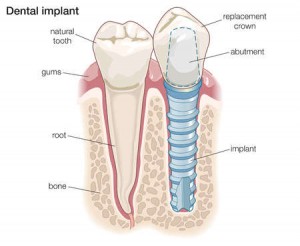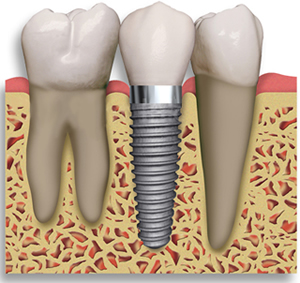 Implants provide us with another alternative to bridges and conventional dentures for the replacement of missing teeth.
Implants provide us with another alternative to bridges and conventional dentures for the replacement of missing teeth.
Implants are surgically placed below the gums and integrate/ fuse to the jaw bone. Since they become ‘one’ with the bone they offer great stability and the closest feeling to natural teeth. Hence they increase self confidence because patients can eat and talk more easily without the worry that conventional dentures bring mainly movement and hence pain during eating and speech. With dental implants you will have none of the problems which can occur with dentures such as looseness, clicking sounds, mouth ulcers etc. If properly maintained implants can last a long time.
Is everybody a good candidate for dental implants? It is important to have healthy gums and adequate strong bone. A deep evaluation by the dental surgeon will determine whether you are a good candidate for dental implants. Appropriate X rays are taken, sometimes also a CT scan is required to give us a deeper insight into the bone structure in 3 dimensions.
However even if there is inadequate bone in the area where the implant should be placed, there are various procedures which can be done to augment/ increase the bone in that area prior to the implant being placed. This will obviously prolong the treatment time for the full procedure from start to finish.
Can one forget about the implant once it is placed and the full procedure is ready? Ideally not. The longevity of the implant, just like our natural teeth , requires regular maintenance and excellent oral hygiene. One must still brush, floss and keep regular visits to the dentist.
How is the procedure carried out?
This is normally done in 2 stages. In the first stage , the surgical phase, the implant is placed in the designated area in the bone. This will then serve as the post/ anchor onto which we will place the tooth eventually. If one implant is being placed, the procedure will not usually exceed 45 mins, and is usually done under a local anaesthetic, tha same local anaesthetic as when a filling is done. When more than 2 implants are placed in the same visit, the patient might opt for sedation or a general anaesthetic. We will prescribe medication for any post operative pain, and also an antibiotic to prevent any infections post- op.
We normally allow anything between 6 weeks to 6 months before moving on to the second phase of the treatment. In this time we may fit on temporary teeth so as to assist you to retain both function and appearance.
Once we are sure that the bone has grown well around the implant and the implant is solidly fixed in the bone, what we call integration, we will proceed to the 2nd stage . A small impression post is placed into the implant and an impression of the post is taken. This is then sent to the dental technician who will proceed to construct a tooth crown under our instructions. While the technician is doing his work, we may/ may not choose to do a temporary crown, depending which part of the mouth the implant is in. When the tooth crown is returned from the lab, it is firmly fixed onto the post.
A common question patients ask is can the implant be rejected by the body. Implants are made from pure titanium, the most biocompatible material around, and used widely for many prosthesis, not only dental implants. The risk of rejection is practically negligible. When implants loosen and are lost its because of poor attention to procedure during their placement, and /or poor maintenance of hygiene around the implant, especially in the immediate period after the surgery. Implants are not a new form of treatment, and they have been used for many years already. Many different systems are available, and the Dental surgeon will discuss and decide the best possible system for your case. Some systems have been around longer than others and so are backed by more research and study. Examples of these systems are Straumann and Nobel Biocare, Astra .
Another common question patients ask is regarding their medical condition vis a vis implants. Since the success of an implant depends highly on good healing around the implant site, then any condition which might affect healing or the ability of the body to resist infections will obviously compromise the success of the treatment. These include uncontrolled diabetes and certain immune diseases. Severe advanced osteoporosis is also cotraindicated for implant placement.
If the procedure goes well is there anything in the near future which might cause the implant to fail, patients sometimes ask?Uncontrolled gum disease close to the implant site might cause the implant to fail, as might also smoking. The latter is not an absolute contraindication to implants, but the patient must be aware that smoking might cause the implant to fail also. Hence very good oral hygiene and avoiding smoking are important to maintain the health of your implant.
What can I do to keep my implant strongly fixed in the bone?
Very good oral hygiene using toothbrush, floss, mouthwashes; regular 6 monthly checks at the surgery so that any problems are detected early and may be seen to. Another factor most patients are concerned about is for how long will they be ‘ out of action’ following the surgery. Well, this varies from one patient to another, however usually one should rest and avoid stress in the first 48hours . Being a surgical procedure , there is usually associated swelling of the face and possibly limited opening of the mouth. Any existing dentures can usually be adjusted to be worn after the surgery, although if bone grafting has been carried out it is advisable to avoid wearing the denture for a couple of days after
Finally, realistically, how long might the full treatment take from start to finish? Overall, your treatment may take anything between 6 months to 1 year to complete, depending on the complexity of the case also. Most of the time is spent waiting for the bone to heal well around the implant, especially if bone has been grafted. With the development of newer implants healing times have been reduced. However it is wise to proceed with caution and not rush before loading the implant with the final definite prosthesis tooth.



